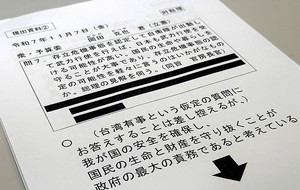March 18, 2024 at 13:48 JST
 An official of the Japan Council of Metalworkers’ Unions fills in the results of wage negotiations on a board in Tokyo's Chuo Ward on March 13. (Asahi Shimbun file photo)
An official of the Japan Council of Metalworkers’ Unions fills in the results of wage negotiations on a board in Tokyo's Chuo Ward on March 13. (Asahi Shimbun file photo)
In this year’s “shunto” spring wage negotiations, many major companies have offered higher pay increases than in previous years.
If the unusually generous offers from big businesses signal a change in their yearslong cautious stance on pay hikes, this would be a welcome new trend.
Even so, the change should represent only a starting point toward achieving a sustained “virtuous cycle” of rising prices and higher wages for the coming years.
This trend must also be extended to small and midsized firms and nonregular workers.
Many leading manufacturers, including Toyota Motor Corp. and Hitachi Ltd., have agreed to all wage demands of their labor unions.
According to a preliminary report released on March 15 by Rengo (Japanese Trade Union Confederation), the nation’s largest labor union umbrella organization, the average wage increase rate, including “teiki shokyu” annual regular pay raises, reached 5.28 percent, meeting Rengo’s target of “at least 5 percent.”
The companies have also agreed to a 3.70-percent “base-up” raise in the base-pay scale.
With Japanese corporate earnings at record-high levels, there is a compelling case for management to provide wage increases at this rate.
Wage negotiations between labor and management in small and midsized firms, which employ about 70 percent of Japan’s workforce, will be in full swing in the coming weeks.
Solid and consistent wage increases for nonregular workers, whose wage levels are only about 70 percent of those of regular employees, are also necessary.
Since prices in Japan began to be affected by inflation overseas, the real wages of Japanese workers, adjusted for inflation, have been languishing below year-earlier levels for 22 straight months to January.
In Rengo’s preliminary report, the average base pay increase rate offered by small and midsize companies has been around 3 percent, barely offsetting last year’s price rises.
Consumer prices are expected to increase in the low 2-percent range in fiscal 2024, which starts in April. Pay hikes would be insufficient unless they significantly push up real wages and improve the living standards of a broad range of workers.
Achieving real wage increases in small and midsized businesses requires proper price pass-through, including labor costs. Large corporations that place orders with suppliers--mostly small and midsized firms--have a significant responsibility for promoting pay growth in this sector.
They have a duty to create an environment that supports wage hikes not only for their own employees but also for their suppliers’ workforces.
The acceptance of many major companies for full labor wage demands has been driven by a deepening labor shortage. As pay raises have become indispensable for securing workers, unions’ bargaining power should have increased.
Considering that some companies, like Nippon Steel Corp., have even offered wage increases exceeding union demands, Rengo and other labor organizations need to review whether they are fully capitalizing on the growing social pressure on companies to raise wages.
Unions should also enhance their basic organizational capabilities as their memberships continue to shrink.
To achieve a virtuous cycle of moderate price increases of around 2 percent and wage hikes that outpace them, it is vital to carry the gains from the spring negotiations into next year and beyond. Both labor and management must reconfirm this imperative.
The Bank of Japan, aiming to achieve its “price stability (inflation) target” of 2 percent, also should ensure the sustainability of wage increases in its policy decisions.
--The Asahi Shimbun, March 16




















A peek through the music industry’s curtain at the producers who harnessed social media to help their idols go global.
A series based on diplomatic documents declassified by Japan’s Foreign Ministry
Here is a collection of first-hand accounts by “hibakusha” atomic bomb survivors.
Cooking experts, chefs and others involved in the field of food introduce their special recipes intertwined with their paths in life.
A series about Japanese-Americans and their memories of World War II